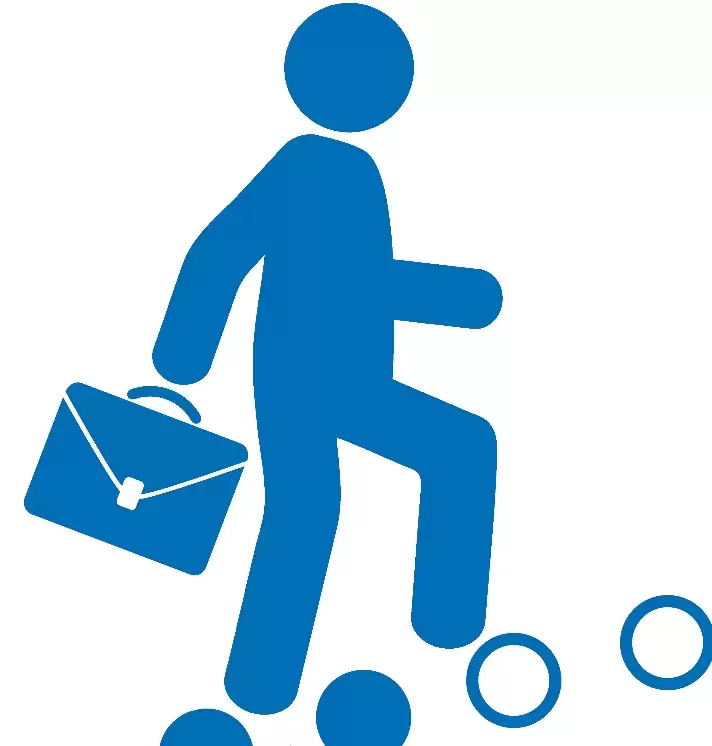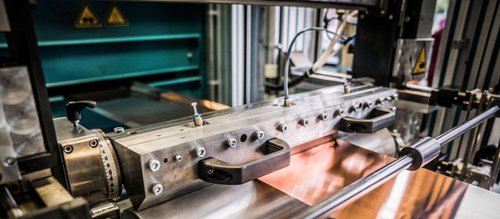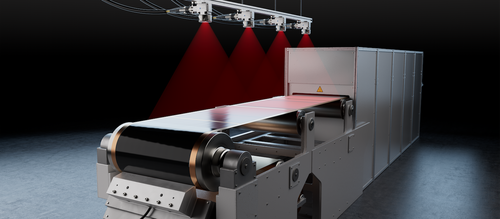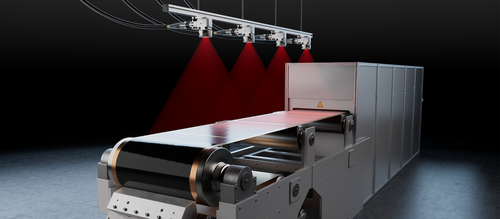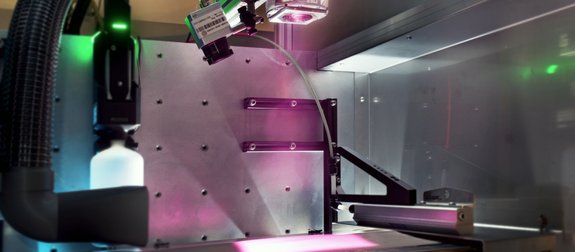
Press Release: Research Project IDEEL
Innovative manufacturing process significantly reduces energy consumption in electrode production
IDEEL Project: Manufacture of laser-dried anodes and LFP cathodes achieved first time in a roll-to-roll process
The IDEEL research project aims to introduce a laser drying process as a more climate-friendly and economical method for the volume production of lithium-ion batteries. Within this context, it has now been possible to produce laser-dried anodes and LFP cathodes in a roll-to-roll process for the first time. The innovative manufacturing process significantly reduces energy consumption in electrode production and at the same time enables the drying speed to be doubled.
Mülheim-Kärlich, January 18, 2023 – As part of the IDEEL research project (Implementation of Laser Drying Processes for Economical & Ecological Lithium-Ion Battery Production) led by Laserline GmbH, the production of laser-dried anodes and LFP cathodes in a roll-to-roll process has been achieved for the first time. Based on industry-relevant electrode pastes, the PEM (Production Engineering of E-Mobility Components of the RWTH Aachen University) was able to demonstrate processability of aqueous LFP cathodes and anodes at the prototype facility at the eLab (also of the RWTH). In cooperation with the MEET (Münster Electrochemical Energy Technology) Battery Research Center, the qualitative properties were evaluated, and optimized electrode pastes then developed. For proof-of-concept a Laserline high-power diode laser with zoom optics was integrated into the existing film deposition system, resulting in generation of a homogeneous laser spot for drying the active material. The temperature distribution across the electrode was monitored using a Optris GmbH thermographic camera. The tests were carried out at a web speed of 1.3 m/min, and both pure laser drying and hybrid drying with both laser and a downstream convection oven were successfully demonstrated.
Initial results indicate that for pure laser drying, the new manufacturing process reduces energy consumption in electrode production by up to 85 percent. Through the addition of the laser, the hybrid process also yielded a doubling of the drying speed when compared to convection drying only. Taken together, battery production can thus be made more cost-effective and efficient. Comparative benchmarking of the qualitative properties (residual moisture of the active material, adhesion of the coating to the carrier film) of convection-dried versus laser-dried electrodes support the indicated gain in productivity. The project results to date demonstrate that a hybrid process approach is achievable not only for new production systems, but also by retrofitting existing convection oven systems with complementary laser drying technology.
Over the course of the remaining project duration, it is planned to scale up the web speed to 10 m/min (Fraunhofer ILT) and ultimately to 30 m/min (Coatema Coating Machinery GmbH). To this end, Laserline is currently developing optics for generating a large-area laser spot. Initial research results also indicate that a reduction of the system size by a factor of 10 will be possible in the future.
IDEEL Project
The IDEEL project (Implementation of Laser Drying Processes for Economical & Ecological Lithium-Ion Battery Production) is a research collaboration supported by the German Federal Ministry of Education and Research (BMBF) as part of the Battery 2020 funding program and led by Laserline GmbH. The other project partners are Coatema Coating Machinery GmbH and Optris GmbH, as well as the Fraunhofer Institute for Laser Technology (ILT), the Fraunhofer Research Facility Battery Cell (FFB) Münster, the Münster Electrochemical Energy Technology (MEET) Battery Research Center at Westfälische Wilhelms-Universität Münster (WWU Münster) and the Production Engineering of E-Mobility Components (PEM) at RWTH Aachen University. The aim of the three-year project is to develop an industry-relevant laser drying process that will enable series production of lithium-ion batteries that is both more climate-friendly and economical.
Initially, a new electrode paste optimized for laser use will be developed as a coating material (PEM RWTH, MEET WWU), a highly efficient laser system with a large-area, homogeneous spot (Laserline), and a highly integrative thermographic camera for contactless process monitoring (Optris, Laserline, Fraunhofer ILT). Based on these contributions, the laser-based drying process will be scaled up to industry-typical feed rates within a demonstrator (Coatema) and the physics-based model of the new drying process subsequently validated (ILT, FFB).
The research results are to be incorporated into the FFB's processes in the future. The work of the FFB is considered one of the flagship projects of German battery research and is expected to become the principle development center of modern battery cell production for both Germany and European partners, with the goal of reducing German and European manufacturing dependence on the world market. A complete production infrastructure is therefore currently being built at the Münster site, with the intention of providing support to companies and research institutions seeking to test and optimize the series production of new battery designs.
Laser drying in the context of battery production
The drying process addressed by the IDEEL project is part of the electrode manufacturing process for high-power battery cells, such as those used in electric vehicles and home storage systems. It is used to dry an electrode paste (slurry), which consists of a specially adjusted, homogeneous active material mixture and is applied to the copper foil of the battery electrode. Up to now, convection dryers have been used to dry this electrode coating, but the thermal energy transfer is only indirect into the material and thus places a heavy burden on both the CO2 balance and the energy costs of battery production. The IDEEL project partners are therefore focusing on up-scaling a more energy-efficient drying process in which the coating is irradiated using high-power diode lasers. The process benefits from the strong absorption of infrared laser light in the coating material, allows for more flexible and precise process control compared to common convection technology, and where the IDEEL project ultimately aims to demonstrate web speeds of up to 30 meters per minute. The compact design and efficient energy transfer are expected to significantly ease the extensive space requirements of the drying sections, which are typically more than 100 meters long – with a significantly reduced spatial footprint for the production environment, the planning of new production systems should enable faster and more energy-efficient process control.
